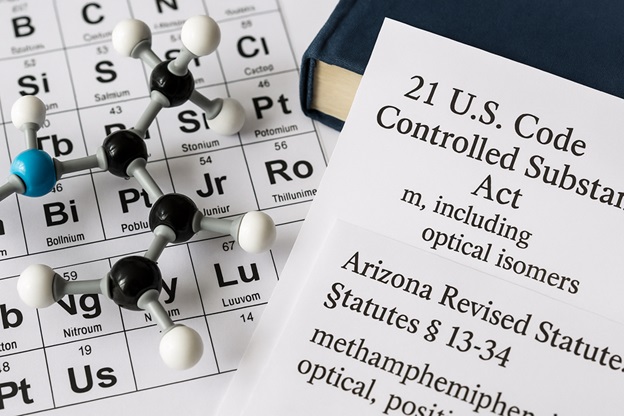
Matter of Felix-Figueroa (2025): Immigration Court Clarifies Drug Convictions and the “Realistic Probability Test”
In July 2025, the Board of Immigration Appeals (BIA) issued an important decision in Matter of Benjamin Felix-Figueroa. This case dealt with whether a state drug conviction in Arizona for selling methamphetamine counted as a “controlled substance offense” under immigration law—and whether the immigrant could be removed (deported) because of it.
The Background
- Who: Benjamin Felix-Figueroa, from Mexico.
- What happened: In 2017, he was convicted in Arizona for possession of methamphetamine for sale.
- Why it matters: Immigration law says that if someone is convicted of a drug offense involving a substance that appears on the federal controlled substance list, they can be deported.
Felix-Figueroa argued that Arizona’s drug law was broader than the federal law because Arizona’s definition of methamphetamine included not only “optical isomers” (a scientific variation of the drug recognized by federal law) but also “positional isomers,” which federal law doesn’t explicitly list.
If Arizona’s law was indeed “overbroad,” his conviction might not qualify as a deportable drug offense.
The Legal Issue: The “Realistic Probability Test”
The core question was: Does the difference between Arizona’s definition and the federal definition really matter in practice?
- The U.S. Supreme Court has said in past cases that a noncitizen cannot just point to a theoretical difference in the wording of a state and federal law.
- Instead, they must show a realistic probability that the state actually prosecutes people for conduct that falls outside the federal definition.
- In other words: it’s not enough to say “Arizona’s law looks broader.” The immigrant must show real cases or evidence that Arizona has prosecuted people for something not illegal under federal drug law.
What the BIA Decided
- Immigration Judges must use the realistic probability test whenever someone argues that a state drug law is broader than federal law because of technical differences (like different isomer definitions).
-
Burden of proof:
- DHS (the government) has to prove the existence of the conviction.
- But once that is shown, the immigrant must prove that there is a realistic probability the state prosecutes substances not covered by federal law.
-
In Felix-Figueroa’s case:
- Arizona includes “positional isomers” of meth in its definition.
- But he could not show that Arizona actually prosecutes people for a positional isomer that isn’t also federally controlled.
- In fact, one positional isomer—phentermine—is controlled under both Arizona and federal law, suggesting there may be no real difference.
Because of this, the BIA ruled that the Immigration Judge was wrong to terminate the case. They sent the case back (remanded) to give Felix-Figueroa another chance to show that Arizona prosecutes isomers not recognized by federal law.
Why This Case Matters
- For immigrants with drug convictions: You can’t defeat a removal charge just by pointing to small wording differences between state and federal law. You must show actual proof (such as real cases) that the state applies its law more broadly.
- For lawyers: This decision sets clear precedent that the realistic probability test must be applied in all drug/isomer mismatch cases in immigration court.
- For the system: It prevents endless technical challenges based on “theoretical” differences in scientific terms, while ensuring fairness if a state truly does go beyond federal law.
Bottom Line
In Matter of Felix-Figueroa, the BIA held that an Arizona methamphetamine conviction still counts as a controlled substance offense unless the immigrant can prove that Arizona actually prosecutes cases involving substances not covered by federal law. The case was sent back to the Immigration Judge, but the decision places the burden squarely on immigrants to demonstrate a realistic probability of overbroad application.
Let’s Get Started
Your legal challenges deserve personalized attention and innovative solutions. Contact Oware Justice Advocates PC today for a consultation and take the first step toward resolution and peace of mind.
355 South Teller Street, Suite 204,
Lakewood, CO 80226
(Visits to the office are strictly by appointment only)
303-514-6589

